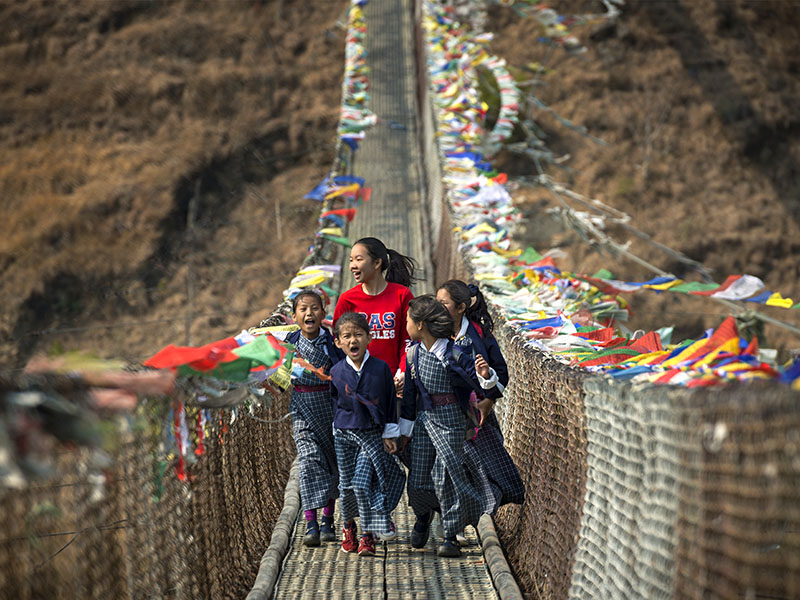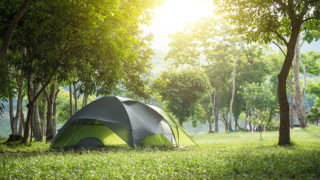Outdoor education experiences are valuable and vital for kids (and fun too!). But how can experiential learning outdoors be incorporated into the curriculum as much as learning in the classroom? We look at how a preschool and some top schools in Singapore include it.
Mosaic Play Academy outdoor learning after school

Mosaic Play Academy believes in the power of outdoor education to foster a well-rounded learning experience for children. Its After-School Program goes beyond simply exploring the natural world – it brings together subjects in ways that are meaningful and engaging. Children learn about the Fibonacci sequence, symmetry in nature and the delicate balance of ecosystems. Rather than teaching subjects in isolation, the academy uses outdoor settings as a medium to illustrate how all the things children are learning come together in real life. Through nature walks, field trips and exploration in the community, students see how concepts in math, science, art and culture are interconnected and affect one another. The school says that this approach to outdoor education nurtures a deeper, more meaningful understanding of the world. It inspires children to think critically, creatively and holistically about the spaces they inhabit.
A recent outdoor education activity
On the Street Art Walk in the Katong and Joo Chiat areas, students explored a range of murals, including one titled ‘High Tide’. This provided an opportunity to discuss Singapore’s land reclamation efforts, the impact of tides influenced by the moon, and how the area was once flood-prone. At the ‘Healing Hands’ mural, meanwhile, students reflected on how sunflowers in the mural symbolised hope and resilience. They discussed how these symbols linked to the area’s past struggles with infant mortality. This created a deep connection between art, culture and history.
After the walk, the students reflected on their outdoor learning experience. They did so by creating collages using pictures they took during the outing. This allowed them to express their understanding of the murals, and the cultural and environmental lessons they encountered. The combination of artistic expression and reflection reinforced the idea that learning extends beyond the classroom and can happen anywhere – in nature, in history and in the streets around us.
402 Joo Chiat Place
8031 2371 | mosaicplayacademy.sg
Dulwich College (Singapore) outdoor learning programmes
Dulwich College (Singapore) (DCSG) believes that education goes beyond books, screens, bricks and mortar. The purpose of its outdoor learning programme is to develop creativity through exploration, build resilience through challenge as well as foster environmental, individual and social responsibility through community interaction. These can be achieved through a combination of outdoor play, adventurous activities, team building exercises, environmental service projects and expeditions in Singapore and beyond. Through these experiential learning programmes, students are given the opportunity to connect with nature and each other, learn how to think critically, cope under challenging circumstances and adapt to change with compassion, empathy and integrity.
During the College’s annual adventure week, Junior School students focus on developing a breadth of core competencies. On water, students paddle a range of craft; on land, they hike and cycle; and at camp, they cook their own food, build shelters and learn how to start a fire. In the Senior School, students undertake a progressively challenging expedition, either by raft, stand-up paddleboard, bike or hike.
The expedition programme culminates in Year 12 when students choose to plan either their own expedition or adventurous service project. During the academic year, students can participate in a variety of experiential CCAs from Beavers, Cubs and Scouts to an Outdoor Adventure CCA, the Duke of Edinburgh’s International Award and a learn to cycle programme.
Programmes that bring experiential learning outdoors
Dulwich is the first international school in Singapore to introduce Forest School into the DUCKS early years programme. Forest School is accredited by the UK’s Forest School Learning Initiative. Dulwich says that it pioneered the movement here to provide real world learning and problem-solving opportunities to young children in a natural environment. Forest School builds on the Nordic concept of friluftsliv or “going back to the forest”, where the landscape provides both the stimulus and the arena of learning. This allows children to develop and apply academic skills, build emotional resilience and learn to manage risk through self-initiated interactions with nature.
71 Bukit Batok West Avenue 8
6890 1003 | singapore.dulwich.org
Singapore American School experiential learning
For one week during the second semester, all regularly scheduled high school courses at Singapore American School (SAS) cease while students and teachers participate in the Interim Semester (IS). This global programme is a required off-campus experience designed to provide high school students with diverse educational experiences beyond the curriculum.
First started 50 years ago, IS allows small groups of students and teachers to explore a challenge, theme or place between the first and second terms. Its goals include challenging oneself, working with peers, getting to know teachers outside the school setting, exploring new places, skills and subjects, and helping others.
The experiential learning courses vary from year to year. They will range from activities in Singapore to international trips to nations in the Asia-Pacific region and beyond. Some opportunities offered to SAS students include trekking in the Himalayas of Nepal, service in the Philippines, exploring the spirituality and culture of Tibet, investigating the history of Turkey, student teaching at SAS’s elementary and middle schools, and sailing or golfing in Singapore.
A student recalls a recent global learning experience
“We’re always reminded of how lucky we are but it was the interactions with Ramabai, a 55-year-old housewife who was our host in Udaipur, India, and the school children, especially the girls, that revealed to me how going to school and the ability to make my own life choices are luxuries not rights. I also learned that community work is not a one-sided phenomenon; I took back invaluable life lessons from the time we spent providing means to stabilise and strengthen another community. Eight days in Udaipur had planted seeds of change in each of our hearts. I won’t need any pictures to remember my first Interim Semester experience and I can’t wait for more similar opportunities in the years to come.” – Rahini Takalkar, Class of 2021
40 Woodlands Street 41
6363 3403 | sas.edu.sg
Looking for more ways to engage your child in experiential learning? Get ideas from our Kids section, such as quirky museums in Singapore. Also, check out some free water parks and playgrounds in Singapore!
Don't miss out on the latest events, news and
competitions by signing up to our newsletter!
By signing up, you'll receive our weekly newsletter and offers which you can update or unsubscribe to anytime.





